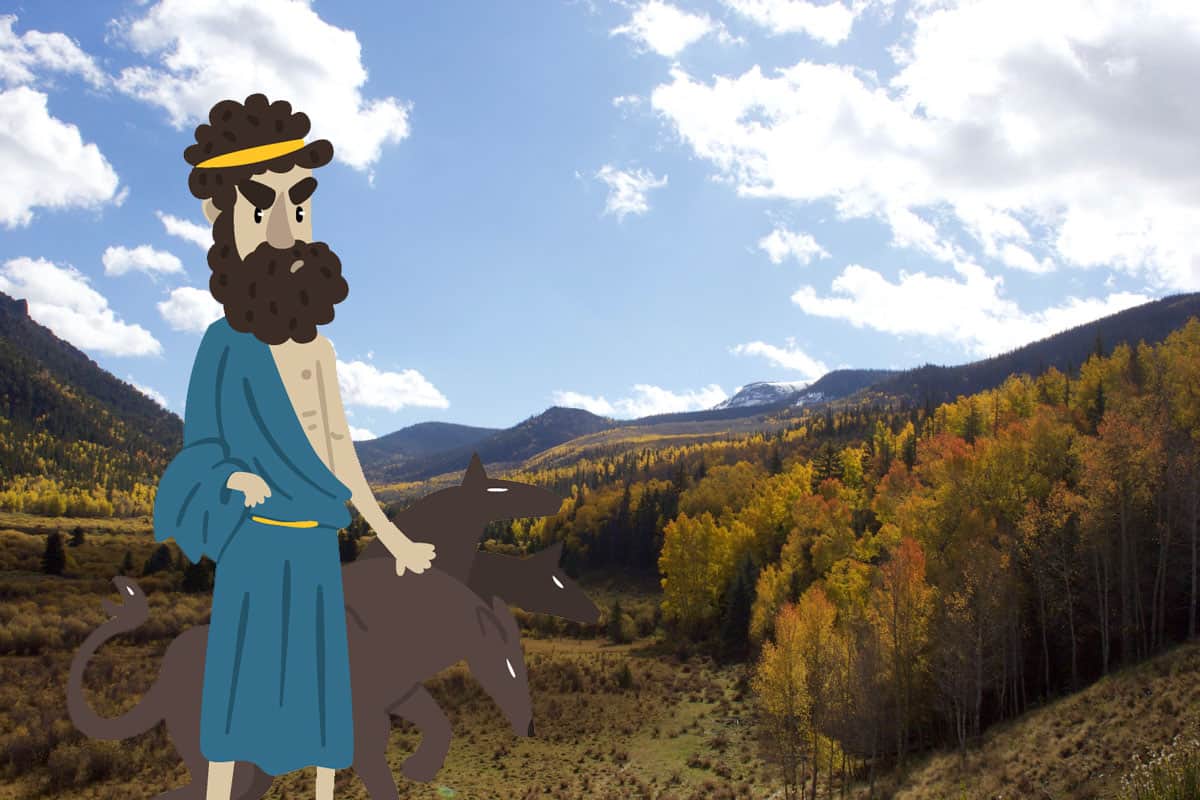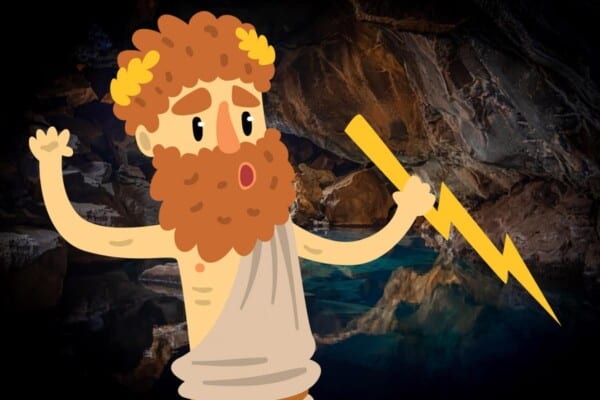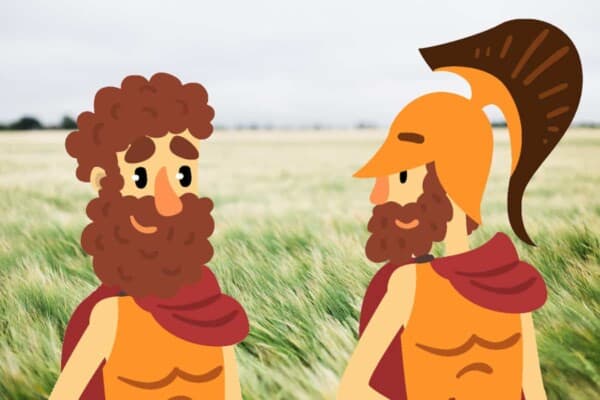Hades is one of the most famous figures in Greek mythology, the King of the Underworld, and God of the Dead, but what does he fear?
According to most stories, Hades isn’t scared of much. There are only three things that he is truly recorded as showing any fear over at all. As an ordered god, he feared overwhelming chaos; as a child of the Titans, he feared their rule over the world; and as a husband, he revered and feared the loss of his wife Persephone, bringer of death.
What Are the Weaknesses of Hades?
Hades, though King of the Underworld, has no similarities to the Christian devil; in fact, he is often portrayed as a positive if not even benevolent force. He is one of the six all-powerful original children of the Titans who ushered in the new age. Though people feared to speak his name, it was due to his indifference to humanity and a mortal fear of death rather than of the god himself.
But like all of his family, Hades has weaknesses. No matter what version of the myth, his main weakness is his passion and adoration of his wife, Persephone.
Persephone (or Kore) was Demeter’s daughter, either by Zeus or by a mortal man. Hades abducted her to the Underworld to be his wife, inciting Demeter’s anger. However, many versions of the story imply that her “abduction” was more of an elopement. Either way, Persephone and Hades ruled side by side in the Underworld. They had perhaps the most stable relationship in Greek lore.
Hades, like all of the gods, suffered from issues with jealousy, stubbornness, and pride. When the three original brothers cast lots to decide who would rule sky, sea, and underground, Hades resented being sent from Olympus to rule underground. However, as a dutiful god, he rules his realm dutifully.
As an interesting aside, Hades’ portrayal in Disney’s Hercules as a jealous god trying to overthrow the Olympians, while fun, was hardly accurate! His behaviour and actions were much closer to Hera’s in Heracles’ original myth, in which Hades doesn’t feature until much later.
Speaking of Heracles, Hades also loved his dog! Cerberus, a three-headed guard dog of the Underworld, is often depicted at Hades’ side. One of Heracles’s missions was to bring Cerberus from the House of Hades. Hades permitted him to do this only if the hero swore not to hurt his puppy and promised to bring him back home!
What Are Hades’s Powers?
As one of the six original Greek gods, Hades had a wealth of powers. He was considered the “dark” equivalent to Zeus, and indeed he was often known as Zeus of the Underworld. He had some significant abilities and traits that set him apart from the rest.
King of the Dead – As ruler of the Underworld, Hades had power over the “shades” or souls of the departed. He judged them and decided the afterlife level they would experience, and he was their King.
The Unseen One – Hades’s name means “invisible” or “unseen,” and one of his powers was to move like a shadow. His helmet, which grants total invisibility, was once loaned to the hero Perseus. Mortals would avoid saying the name of Hades and cover their eyes if making offerings to him.
Lord of Metal and Riches – As a chthonic (subterranean) god, Hades was also heavily associated with veins of precious metal under the earth’s surface. He was the most materialistically wealthy of the gods.
What are Some of the Epithets of Hades?
Since mortals would not often speak his name, Hades had many epithets, perhaps even more than the other gods and goddesses of Greek lore. Some of the most popular in Greece, Rome, and others include:
| Name | Source | Meaning |
| Pluto | Roman equivalent | “The Wealthy One,” from Greek Plouton. |
| Agelastus | Greek | “Melancholy” |
| Aidoneos | Greek | “Ruler of Many,” taken from the King, who was either Persephone’s father or her first husband. |
| Moiragetes | Greek | “Guide of the Fates” |
| Ophieus | Greek (Messenian) | “The Blind One” |
| Niger Deus | Latin | “The Black (Dark) God” |
| Opertus | Latin | “The Concealed One” |
| Saturnius | Latin | From his father, Saturn (Cronos) |
| Stygius | Etruscan | From the River Styx |
| Zeus Katachthonios | Greek | “Zeus of the Underworld” |
| Klymenios | Greek | “Renowned” |
| Hegetes | Greek | “The Conductor” |
Who Were the Consorts and Children of Hades?
Depending on the myth, Hades usually had significantly fewer children than the other gods. Unlike Zeus with Hera or Poseidon with his wife, Amphitrite, Hades was mostly faithful to Persephone.
Persephone is a goddess of spring and the harvest. There are several explanations of her name, from “gatherer of grain” to “bringer of death” Her epithet Kore simply means “the maiden.” She was both gentle and terrifying, making her the perfect connection between the Underworld and Olympus – and the ideal queen for the King of the Dead. By all accounts, the two of them loved each other very much, whether their relationship started by abduction or elopement.
However, Hades did have two other consorts who gained his love while Persephone was on Olympus instead of in the Underworld.
The first was Leuce, a nymph and the daughter of Oceanus. Hades loved her and took her to the Underworld, where she lived out the rest of her natural life. When she died, Hades made her into a white poplar tree in the fields of Elysium. It was this tree with which Heracles would later use to crown himself. Leuce was both a rival and an epithet of Persephone.
The second was Minthe, a naiad. Hades had a brief affair with Minthe after she spent time seducing him, but he left her as he feared upsetting Persephone. Upset, Minthe loudly compared herself to Persephone and claimed to be better and more deserving of Hades. The furious Persephone retaliated by turning her into the mint plant.
Several myths speak of children of Hades, but the most relevant and commonly referenced are:
- Zagreus – His name means “hunter and capturer.” His mother was Persephone. He is sometimes conflated with the Olympian Dionysus, and in Orphic tradition, his father is Zeus rather than Hades. Zagreus is also sometimes simply an epithet for Hades himself.
- Makaria – Her name means “blessed,” and she has no mother in myth. She was the physical embodiment of a peaceful, blessed death. She shared her name with the daughter of Heracles, who offered her life in sacrifice to Persephone. For this reason, they’re often discussed together.
- Melinoë – A Chthonic nymph or goddess whose name means “golden-yellow” from the quince fruit’s color, which the Greeks associated with death’s pallor. Melinoë is Persephone’s daughter by both Hades and Zeus, who are aspects of each other in Orphic lore.
- Plutus – A god of wealth, from the same root as “Pluto.” Depending on the myth, he is either the son of Demeter and Iasion or of Hades and Persephone.
Final Thoughts
Hades is a very interesting god because he is one of the most well-known yet least spoken about in the original Greek lore. His relationship with Persephone, in particular – one of the few married goddesses who was able to rule as an equal queen – has inspired a resurgence of popularity in the modern-day.
Hades is often seen as quite a romantic figure these days. From webcomics like Lore Olympus to several different romance books, some of which feature Persephone and some do not, his loyalty and devotion serve as an inspiration for creative types everywhere.
In this way, Hades’s greatest weakness – his adoration of Persephone – is also his greatest strength.













